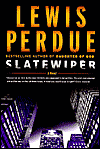Seeds of Terror: How Heroin is Bankrolling the Taliban and al Qaeda
Seeds of Terror: How Heroin is Bankrolling the Taliban and al Qaeda
By Gretchen Peters, Thomas Dunne Books, May 2009 ISBN: 978-0312379278 Hardcover, 320 pages, $25.95
(A shorter version of this review by Lewis Perdue appeared in Barron's Weekly.)
Exit, Allah. Enter, the almighty dollar.
According to Seeds of Terror: How Heroin is Bankrolling the Taliban and al Qaeda, by Gretchen Peters, most of the Taliban's religious fanatics have been replaced by organized gangs of big-time drug thugs whose primary goal is to protect their cut of the multi-billion-dollar Afghan heroin trade. Peters estimates that the Taliban get at least 70 percent of its funding from the heroin trade and that both Hezbollah and Al Qaeda also benefit from global dope.
While Western media pundits wring their hands about the Afghanistan troop surge turning into another Iraq, Peters, who covered Pakistan and Afghanistan for Associated Press and ABC writes that:
"The parallels are actually closer to Colombia. The Taliban and the Revolutionary Armed Forces of Colombia, known by their Spanish acronym FARC, both got their start like modern-day Robin Hoods, protecting rural peasants from the excesses of a corrupt government. Strapped for cash and needing the support of local farmers, both groups began levying a tax on drug crops."
Then, Peters explains, both FARC and the Taliban started providing protection for the drug lords, gradually taking control of the drug refineries and strong-arming farmers to meet drug production quotas. Severe punishment or death awaited those who failed or refused. Finally, FARC and the Taliban established themselves as alternate systems of a dictatorial government ruling by fear and violence.
And like the FARC, which tried to maintain a virtuous, “people’s army” facade, the narcoterror leadership of today's Taliban uses jihad as a convenient public relations stunt to gloss over its greed and lust for power. Peters tell us that Helmand province – one of the key battle areas for the current U.S. military surge – produces more than half a billion dollars a year in opium. “If it were a separate country, it would be the world’s leading opium producer ….It’s also where links between the Taliban and opium trade are the strongest.” Small wonder then that fighting is fiercest there today. But all across Afghanistan, where there are drugs, the Taliban is there with protection: attacking NATO checkpoints so opium shipments can get through, planting mines around opium fields and rigging IEDs to take out soldiers who dare trespass on the poppies.
But, Seeds of Terror makes it ironically clear that the Taliban could not have achieved its preeminent position in the illegal global drug trade without the blundering of every U.S. President beginning with President Jimmy Carter.
Peters tells us that Jimmy Carter, in 1979, signed off on secret aid to Afghan guerillas fighting against the Soviets despite warnings that the groups were moving dope. President Reagan continued the policy of looking the other way.
After the Russians left Afghanistan, President George H. W. Bush terminated most aid – hundreds of millions of dollars worth – to the guerillas and government. “Overnight, that left 135,000 armed Afghans and their families no way to support themselves,” Peters quotes a former CIA officer.
When President Clinton took office in 1993, his administration eliminated what little financial support was still trickling toward Kabul.
And while money began to flow with the second Bush administration’s invasion of Afghanistan, not only had the damage done turned the Taliban into a potent, well-financed adversary, but military errors to come also complicated military strategy that continue even as you turn on the evening news tonight.
The military, Peters tells us “doesn’t do drugs.” That is, despite the fact that the Taliban insurgency runs on the lifeblood of opium, the military refused to support anti-drug operations. “One Green Beret complained that he had been ordered to disregard opium and heroin stashes when he came across them on patrol.”
The consequences of all these bone-headed decisions become more significant in the light of a Stanford University study cited by Peters that found, “Out of 128 conflicts studied, the 17 which relied on ‘contraband finances’ lasted five times longer than the rest.”
Seeds of Terror offers layer after layer of fascinating information about the deadly consequences of decades of disastrous public policy decisions. This is a well-written, well-documented and exemplary work of journalism.
Lewis Perdue is a former Washington correspondent, journalism professor and the author of 20 published books. He is currently editor of WineIndustryInsight.Com.
![[books1]](http://barrons.wsj.net/public/resources/images/BA-AR550_books1_A_20091230164214.jpg)


